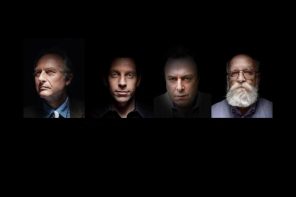A few months ago, one of us (okay, Andrew), referred to the esteemed physicist and public intellectual Lawrence Krauss as “a windbag.”
One of us (Michael) can attest that Andrew is among the kindest, most thoughtful people he knows. So what raised Andrew’s ire? Krauss, Arizona State University’s Foundation Professor of the School of Earth and Space Exploration, and the Director of the Origins Project, had publicly dismissed religion as a mix of vague hopes and fears, “hanging on for its evidence by mere shreds of emotional and ideological spaghetti.”
We founded The Cubit with a simple maxim: to be skeptical of the dogmatic rhetoric that plagues religion and science debates—on both sides. Krauss’s brand of scientific triumphalism, which reduces religion to an ideological strawman, is silly, lazy, hackneyed, and boring. Peddling a bigoted ideology, we think, qualifies you for windbag status.
After reading Krauss’s latest piece for The New Yorker‘s website, “All Scientists Should Be Militant Atheists,” it’s clear that Krauss remains a windbag as he continues to promote an extremist, incoherent view of science and religion. Which is a shame, because among all his breezy posturing is the kernel of a very good point.
Krauss is upset about Kim Davis, the Kentucky clerk whose decision to refuse marriage licenses to same-sex couples has set off a national firestorm (and a number of incisive RD articles). Krauss points out, correctly, that if we allow Davis to use her political station to interfere with government conduct that violates her religious beliefs, we’d also need to extend this privilege to other religious fundamentalists and whatever beliefs they claim to sincerely hold (a point he unfortunately makes using Islam as an example, reinforcing accusations that New Atheists disproportionately pick on Islam).
In Krauss’s analysis, the hardest part of living in a pluralist democracy is that we have different, and sometimes competing values of the sacred. Like any good secularist, Krauss argues that the solution is to bracket our private beliefs when we’re working on behalf of the public, a logic he extends to science (where, he argues, nothing is sacred):
No ideas, religious or otherwise, get a free pass. The notion that some idea or concept is beyond question or attack is anathema to the entire scientific undertaking. This commitment to open questioning is deeply tied to the fact that science is an atheistic enterprise.
Krauss is right to draw the connection between science and the concept of a secular public square. Both emerged around the same period in history, and both aim to establish certain fundamentals by rounding out the particularities of individual belief.
Just as a government clerk must bracket her personal beliefs to avoid imposing her values onto others, so too must the scientist set aside personal religious beliefs when conducting an experiment. So far so good.
But when Krauss suggests that principled science and atheism go hand-in-hand, and that scientists should join him in ridiculing religious dogma, he’s far less convincing. In fact, Krauss unwittingly pulls a Kim Davis, evangelizing his own ideology in the name of so-called fairness.
Rather than a sensible refutation of an anti-pluralist stance, “All Scientists Should Be Militant Atheists,” amounts to a credal scrawl–a patchwork of arguments, ideas and anecdotes that’s redolent more of a bitter sensibility than a coherent thesis. In one bizarre example, Krauss attempts to connect free inquiry, atheism, and speaking out in the name of science. Noting first that “[s]cientists have an obligation not to lie about the natural world,” he chastises those who “remain silent rather than pointing out contradictions between science and religious doctrine.” It’s not enough to work in the lab, apparently—scientists must also be in the business of smashing idols. Krauss never explains exactly why scientists should take the time to “refer to the fact that religion and science are often in conflict” and to “ridicule religious dogma,” but he is convinced that this would be a valuable undertaking.
Krauss then characterizes half a millennium of human history in terms that would make even the most triumphalist of patriot preachers blush: “five hundred years of science have liberated humanity from the shackles of enforced ignorance.” Of course, we can’t thank science alone for the Enlightenment (debts are owed to economics, philosophy, and inter-religious tolerance just the same), not to mention the fact that we don’t exactly live in an age of blissful technoscientific Jetsons-esque harmony.
We agree with Krauss when he argues that “science holds that no idea is sacred,” (though we must acknowledge that science is a human endeavor, so it seldom lives up to its highest ideals). Scientific inquiry shouldn’t privilege any particular system of ideals or values. No fact is safe, no theory transcendent. But Krauss breaks this very rule by making Science itself sacred. “Science,” with a capital S, is a monolithic, positivist conception of science commonly peddled by New Atheists. Where science is ultimately value neutral, “Science” is normative—hailed as liberatory, progressive, and inherently godless. For Krauss, we ought to evangelize on behalf of Science because it can liberate humanity if it wins out in its cosmic battle against Religion.
It’s telling that Krauss doesn’t call for agnosticism, but instead “militant atheism.” However tongue-in-cheek the phrase may seem, it points to a significant aspect of Krauss’s argument. Krauss isn’t saying, “leave your sacred out of my science.” He’s saying, “here’s my sacred, which all of you should likewise hold sacred.” If this strategy sounds familiar, it’s because this is the same tactic deployed by Kim Davis.
Pluralism isn’t about forcing everyone to share your political and religious views. It’s about setting up the conditions for different worldviews and communities to occupy a space productively alongside each other. That’s why Kim Davis is wrong to deny marriage licenses to couples in Kentucky, and that’s why Krauss is wrong to suggest that atheism—militant or otherwise—is the only appropriate position for scientists.
We don’t need more militant thinkers in science or in public life. We simply need anyone willing to participate in critical self-reflection about the limits of their worldviews, whether they be a Christian scientist, an atheist, a Muslim, a “none,” or a Christian Scientist. Otherwise, we’d be talking at length about little of value: the definition of a windbag.
Also on The Cubit: New Atheism Produces Another Curiously Uncurious Science v. Religion Book





